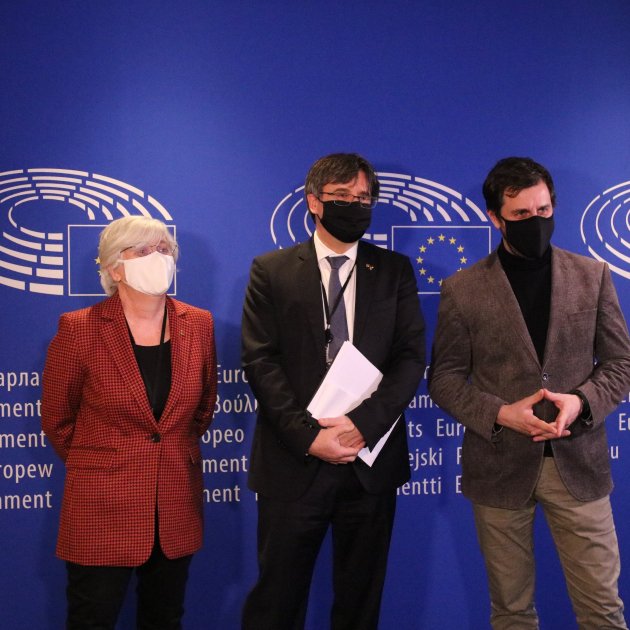Catalan MEPs Carles Puigdemont, Toni Comín and Clara Ponsatí are taking the European Parliament to the General Court of the European Union (EGC) for lifting their immunity. The three pro-independence Junts party deputies have filed an appeal at the Luxembourg-located court over the stripping of their parliamentary protection from prosecution, as demanded by the Spanish Supreme Court, which seeks their extradition for the Catalan referendum case.
During the processing of the court's request in the European Parliament two months ago, the MEPs' defence lawyers complained about a number of irregularities in the procedure, such as an error in the report on the offences for which Ponsatí is sought by Spain.
For now, their defence team does not want to detail the specific arguments it will put before the EGC.
The judicial battle of the exiled Catalan politicians in Europe is being played out in a number of different judicial institutions. The EGC route is a new one. But since March, when the vote to lift their immunity was taken, lawyers have been handling the case before the European Court of Justice (ECJ).
A new judicial battle
The legal team defending the pro-independence politicians Puigdemont, Comín and Ponsatí has opened parallel legal approaches and is preparing for a one-year judicial battle in the ECJ and the EGC. "The Belgian courts will wait until Luxembourg rules," says Flemish lawyer Paul Bekaert.
Clara Ponsati’s Scottish lawyer Aamer Anwar also suggests that the Scottish courts will wait until they have the Luxembourg ruling on the appeal against the waiver of immunity. However, the legal team also admits the challenge of winning this case. "It is a difficult case," admits Bekaert, although he recalls that in the case of jailed Catalan leader Oriol Junqueras the ECJ contradicted the European Parliament.
Two months ago, the Catalan trio's defence team announced that they would appeal against the decision of the European Parliament, as well as making a request for interim measures. At that time, Anwar was already denouncing the "irregularities" in the management of the request, such as the erroneous report on his client, which the Parliament nevertheless voted on. He also criticizes the fact that the Committee on Legal Affairs, which drafted the proposal to lift immunity, was not "impartial." “Ponsatí will continue to fight,” he assured.
An appeal seemed certain
On March 9th, the European Parliament approved the report which recommended lifting the immunity of the the MEPs. There was no debate in the parliamentary chamber, as the report was considered in the framework of the Committee on Legal Affairs, where it was discussed and approved, and the vote in the plenary was electronic.
It was action from the Spanish justice system which led the European Parliament to consider this request for an immunity waiver for the members of the 2017 Catalan government exiled in Brussels. While already in exile, in 2019, the three stood for the European Parliament, and were elected by Spanish and Catalan voters; then, following the European court ruling on Oriol Junqueras, they overcame an initial blockage from the Spanish authorities and took their seats in Parliament at the beginning of 2020. Immediately, Supreme Court investigating judge Pablo Llarena activated the request to lift their parliamentary immunity and re-activate the European Arrest Warrants against them which Spain has persevered with, despite judicial defeats around Europe, since 2017.
The MEPs' lawyers had already said that if the chamber agreed to lift their immunity they would make a case to the EU Court. Meanwhile, the issue will also reach the Luxembourg court via yet another route: in the face of Spanish justice's repeated defeats in Europe, and in particular the Brussels Court of Appeals rejection of the European Arrest Warrant against the former Catalan culture minister Lluís Puig, the Spanish judge Llarena himself has asked the court to rule on a series of preliminary questions.
And now, a new route, that of the EGC, to make a case against the European Parliament directly.
